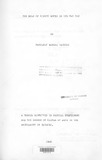| dc.description.abstract | This study was undertaken in Mathira and Tetu Administrative Divisions of Nyeri District, These areas were chosen because they were, throughout the years of the Emergency, a hotbed of Mau Mau activities,
* \
The study is on the role that Kikuyu women played in the Mau Mau struggle for Independence. It argues that the role of women in the movement has been seriously neglected in spite of the fact that oral data from actual participants convincingly show that women featured prominently in the movement. The study, therefore, analyses the various ways in which women were actively involved in the Mau Mau and indicates that women were in fact a critical and decisive element in the shape that the Mau Mau assumed. It is further contended that without their active co-operation and assistance Mau Mau would certainly not have been as effective, or survived, as long as it did.
The study underscores that Mau Mau broke out in 1952 because of the various colonial frustrations that
(V)
faced Kenyans and the Kikuyu in particular. And with regard to women, it attempts to explain why they were so zealously drawn into the Mau Mau. This zeal is explained within the context of the changing role of Kikuyu women. It is contended that such factors as education, Christianity, employment, petty businesses, among others, had an important impact on Kikuyu women during the colonial period. Because of them, women were edged into roles hitherto regarded as the preserve of men. The colonial view, that women were ardent supporters of the Mau Mau because in it they had been accorded some status in a society where hitherto they had little significance, is shown to be grossly erroneous. Such a view not only underestimates the influence of women in the traditional society but also fails to consider factors that changed their traditional status over the years.
Furthermore, it is shown that women featured prominently in the organizational network between the fighters in the forests and the reserves. The study analyses this network and its importance as the life- link between the fighters and the reserves. It is shown that so important was this link in sustaining the movement that Government's strategy to herd people into the Mau Mau villages in 1954- was an attempt largely
(vi)
aimed at breaking up this support. But the versatility of women activists in the Mau Mau is seen in that, although villagisation was a great blow to the supply lines, women were still able to devise ingenuous methods to support the fighters.
The role of women in the courier service is also discussed in this study. The service is shown to have been crucial as the only reliable means of communication for the freedom fighters. A number of cases are cited to show that women were invaluable as couriers and that sometimes their efficiency averted disasters which would otherwise have wiped out individual groups of freedom fighters.
Finally, the study shows that the greatest contribution of women to the Mau Mau was outside the domain of actual combat. Nevertheless a few women took to the forests as support wings and acted as the transport, signals, medical corps and ordnance to their male counterparts. These eased the very difficult conditions that fighters faced in the forests. The study also suggests that a few individual women merit the term, Itungati, the reference term used for actual fighters, for their contribution in actual combat. | |

